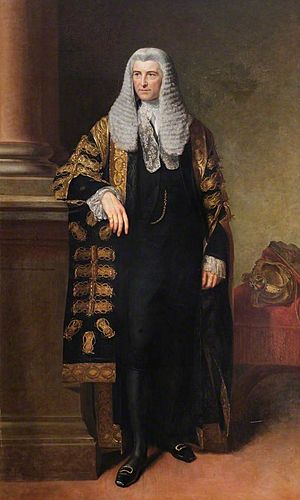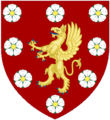Frederic Thesiger, 1st Baron Chelmsford facts for kids
Quick facts for kids
The Lord Chelmsford
|
|
|---|---|
 |
|
| Lord High Chancellor of Great Britain | |
| In office 26 February 1858 – 11 June 1859 |
|
| Prime Minister | The Earl of Derby |
| Preceded by | The Lord Cranworth |
| Succeeded by | The Lord Campbell |
| In office 6 July 1866 – 29 February 1868 |
|
| Prime Minister | The Earl of Derby |
| Preceded by | The Lord Cranworth |
| Succeeded by | The Lord Cairns |
| Personal details | |
| Born | 25 April 1794 London, United Kingdom |
| Died | 5 October 1878 (aged 84) London, United Kingdom |
| Resting place | Brompton Cemetery |
| Political party | Conservative |
| Spouse |
Anna Maria Tinling
(m. 1822; died 1875) |
Frederic Thesiger, 1st Baron Chelmsford (born April 25, 1794 – died October 5, 1878) was an important British lawyer and politician. He was a member of the Conservative Party. He held the very high position of Lord High Chancellor of Great Britain twice. This role is like the chief judge and a top government minister.
Contents
Early Life and Family Roots
Frederic Thesiger was born in London. His father, Charles Thesiger, worked as a customs collector in St Vincent, a Caribbean island. His mother was Mary Anne Williams.
Frederic's grandfather, John Andrew Thesiger, came to England from Saxony (part of modern-day Germany). He worked as a secretary for a powerful leader named Lord Rockingham. Frederic also had an uncle, Sir Frederick Thesiger, who was a naval officer. He served with the famous Lord Nelson during the Battle of Copenhagen in 1801.
A Career in Law and Politics
Frederic Thesiger first planned to join the navy. He even served as a midshipman (a junior officer) on a ship called HMS Cambrian in 1807. He was part of a battle in Copenhagen. However, his only surviving brother died around this time. Frederic was then set to inherit a valuable family estate in the West Indies.
Because of this, he decided to leave the navy. He chose to study law instead. The idea was that he would practice law in the West Indies and manage his family's property there. He began his law studies in 1813 and became a lawyer on November 18, 1818. He quickly became successful in his legal work.
Key Legal Cases
In 1824, Thesiger became well-known for defending Joseph Hunt in a murder trial. Eight years later, in 1832, he won a very difficult property case in Chelmsford. This case was so important to his success that when he became a noble, he chose the title Baron Chelmsford.
In 1834, he was named a King's Counsel. This is a special title for experienced lawyers. In 1835, he worked on a case that removed a famous politician, Daniel O'Connell, from his seat in Dublin.
Entering Parliament
In 1840, Frederic Thesiger was elected to the Parliament for Woodstock. He became the Solicitor General in 1844. This is a top legal advisor to the government. He later lost his seat in Woodstock and had to find another one in Abingdon.
In 1845, he became the Attorney-General. This is the chief legal officer of the Crown. He held this job until the government changed in 1846. He continued to work as a lawyer and was involved in many important legal cases.
Becoming Lord Chancellor
In 1858, Frederic Thesiger was chosen to be the Lord Chancellor. This is one of the highest and oldest offices in the British government. The Lord Chancellor is in charge of the justice system and is a senior member of the government. He served as Lord Chancellor again from 1866 to 1868. When the Prime Minister, Lord Derby, retired, his replacement, Benjamin Disraeli, wanted a different person for the role. Lord Chelmsford was replaced by Lord Cairns.
Family Life
Lord Chelmsford married Anna Maria Tinling in 1822. They had four sons and three daughters.
His oldest son, Frederic, inherited his father's title. This Frederic became a soldier. He faced a very difficult battle at Isandlwana. However, he later won an important victory at Ulundi, which helped him regain his reputation.
Lord Chelmsford's second son, Charles Wemyss Thesiger, was also a high-ranking officer in the Army. His third son, Alfred Henry Thesiger, became a judge, serving as a Lord Justice of Appeal.
Lord Chelmsford's wife, Lady Chelmsford, passed away in 1875. Lord Chelmsford died three years later, in London, on October 5, 1878, at the age of 84. He is buried in Brompton Cemetery in London. His daughter, Julia, was married to Sir John Eardley Inglis. Sir John commanded British forces during the Siege of Lucknow in 1857. Julia later wrote about her experiences during the siege.
Images for kids
 | George Robert Carruthers |
 | Patricia Bath |
 | Jan Ernst Matzeliger |
 | Alexander Miles |



